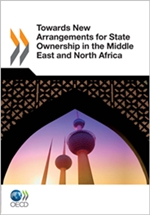Corporate governance principles
Towards New Arrangements for State Ownership in the Middle East and North Africa
|
Date of publication |
Buy a paper copy or browse online Access for subscribers to OECD iLibrary Access for government officials with OLIS accounts
The role of state-owned enterprises (SOEs) in the Middle East and North African economies (MENA) has historically been and remains significant in terms of their contribution to the economic value added, employment and the provision of vital services. State-owned enterprises operate across a wide range of sectors in the region - hydrocarbons, banking, construction – but also in network industries. Despite the privatisations carried out during the 1980-1990s, the role of the state in Arab economies has not declined and in many ways have indeed increased, reflecting the growth of oil and gas SOEs, sovereign wealth funds and infrastructure development projects, often carried out with the involvement of the state. This publication seeks to provide insight into the varied and rich experience in SOE reform in the region over the past decade, highlighting reform initiatives undertaken at national and country specific levels. It is unique in highlighting the challenges faced by policymakers in reforming the governance of regional SOEs.
See also >> More about OECD work on corporate governance in the Middle East and North Africa |
Related Documents
